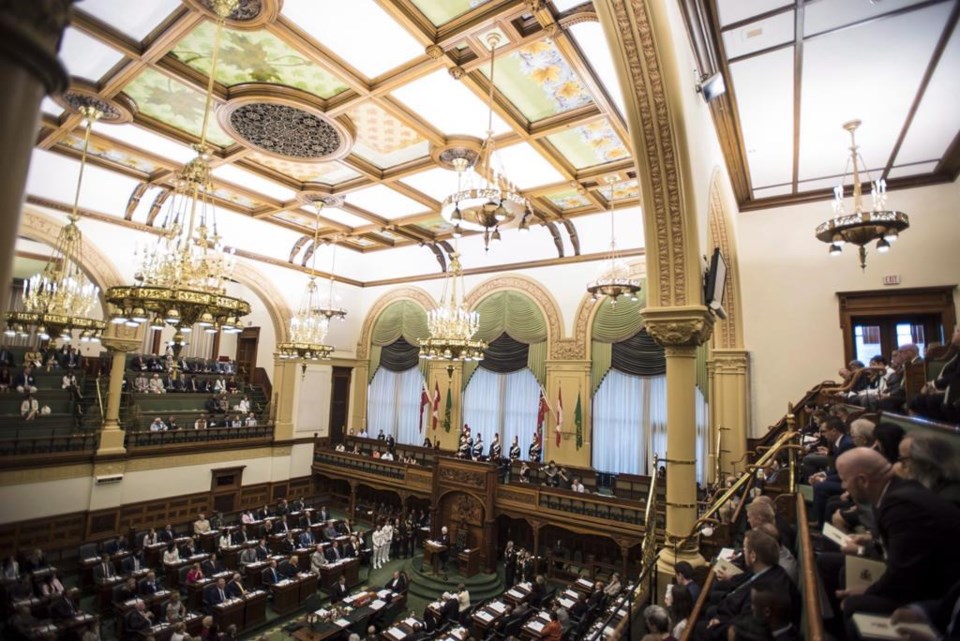TORONTO — Premier Doug Ford will offer a fresh agenda Monday through a throne speech expected to focus on pandemic recovery, but may hint at new policies ahead of the next election, as some major promises from 2018 remain unfulfilled.
The speech, which comes after he prorogued the legislature, ending a more than three-year session, marks Ford's first real chance to reset his roadmap for the province since his Progressive Conservatives won a majority government.
Since then, he has accomplished much of the roughly 60 promises in his election platform, though most of the signature ones are not checked off.
Income taxes have not been cut, gas prices are not 10 cents lower, and beer and wine are not sold in corner stores.
The pandemic changed priorities for governments and individuals alike, and the province has focused much of its energy and spending on recovery. That may mean that there is little time and money left to accomplish the rest of the promises made before COVID-19 plunged the world into turmoil.
A spokeswoman for the premier said the speech from the throne will be "overwhelmingly focused" on the ongoing fight against COVID-19.
Mitchell Davidson, Ford's former executive director of policy, said one unfulfilled 2018 promise he thinks is most likely to still be in Ford's plans is an income tax cut, as it could be used to spur pandemic recovery.
"There’s a lot of different arguments and cases that can be made for some form of broad-based tax relief, for government to reduce the cost of living in a way that it can control…it can actually put more money back into people's pockets," said Davidson, now the executive director of the StrategyCorp Institute of Public Policy and Economy.
"What an interesting opportunity to both do what you said you were going to do and also do something that will be inherently popular and needed for people right now."
Finance Minister Peter Bethlenfalvy's spokeswoman, Emily Hogeveen, said, "any tax changes must be considered in the context of other government priorities and the overall fiscal situation while Ontario continues to address the impact of the COVID-19 pandemic."
Ford also promised in 2018 to cut gas prices by 10 cents. Ending the previous Liberal government's cap-and-trade system was to lower prices by 4.3 cents and the rest would come from cutting the provincial fuel tax.
The Progressive Conservatives did end cap and trade, but that meant the federal carbon tax backstop kicked in, negating savings at the pump. Ford's government tried fighting it in court, but lost. The provincial fuel tax rate remains unchanged from 2018.
Dan Moulton, a vice-president at Crestview Strategy and former senior Liberal staffer, said the pandemic so far has allowed Ford to present a coherent agenda of battling COVID-19 and recovering from it, but as it starts to recede he'll need to lay out what happens beyond the current crisis.
"This throne speech, I think, provides them the first opportunity to establish a vision for what they actually plan to do," he said.
"I think the government is going to face critiques over the course of the next eight months or so over those certain things they have yet to fulfil - hydro rates probably the most glaring because they attached a 12-per-cent reduction number to it."
The Progressive Conservatives promised in 2018 to lower hydro bills by 12 per cent at a time when high bills were a key election issue. A spokesman for the Ministry of Energy noted that a number of rate relief programs were introduced during the pandemic, and that savings first introduced by the previous Liberal government are continuing.
Moulton said the government has likely discovered cutting hydro bills in Ontario is very difficult.
"I think the government's preference will likely be to talk as little about electricity prices in advance of the election as possible," he said.
"It’s not a winning issue for them, it’s not a winning issue for anyone, and, frankly, I don’t think it’s top of mind for voters."
When it comes to putting beer and wine in corner stores, the one-time banner election promise had already seemingly fallen down the government's to-do list before the pandemic hit. After Rod Phillips was named finance minister in 2019, he didn't take up the Beer Store sabre rattling of his predecessor.
Bethlenfalvy's spokeswoman said a "comprehensive review of the beverage alcohol sector" is underway.
Davidson noted that the government has made a number of major moves on alcohol liberalization, such as permanently allowing restaurants to sell alcohol with take-out and delivery, appeasing consumers.
At this point Ford might as well just promise to let the Beer Store deal that effectively keeps beer out of corner stores expire in 2025 and not to renew it, he said.
Davidson suspects most of the throne speech will be high level, with perhaps one or two mentions of a big-ticket promise.
"I think on a whole it’s a very sobering experience for the government to go through," he said.
"Lots has changed from the 2018 throne speech, so being sort of forced in a way to put some markers in the sand and define what you’re going to be about is a really important activity."
This report by The Canadian Press was first published Oct. 3, 2021.
Allison Jones, The Canadian Press

